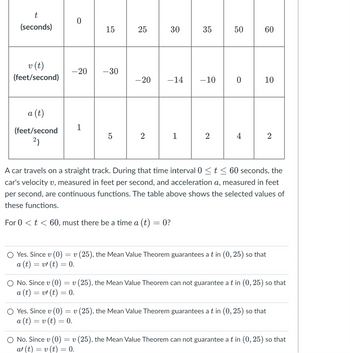
Calculus: Early Transcendentals
8th Edition
ISBN: 9781285741550
Author: James Stewart
Publisher: Cengage Learning
expand_more
expand_more
format_list_bulleted
Question

Transcribed Image Text:t
(seconds)
v (t)
(feet/second)
a (t)
(feet/second
2)
0
15
-20 -30
1
5
25
-20
2
30
-14
1
35
- 10
2
50
0
4
60
10
A car travels on a straight track. During that time interval 0 ≤ t ≤ 60 seconds, the
car's velocity v, measured in feet per second, and acceleration a, measured in feet
per second, are continuous functions. The table above shows the selected values of
these functions.
For 0 < t < 60, must there be a time a (t) = 0?
Yes. Since v (0) = v (25), the Mean Value Theorem guarantees a t in (0,25) so that
a (t) = v (t) = 0.
2
O No. Since v (0) = v (25), the Mean Value Theorem can not guarantee a t in (0, 25) so that
a (t) = v1 (t) = 0.
Yes. Since v (0) = v (25), the Mean Value Theorem guarantees a t in (0,25) so that
a (t) = v (t) = 0.
O No. Since v (0) = v (25), the Mean Value Theorem can not guarantee a t in (0, 25) so that
al (t) = v(t) = 0.
Expert Solution
This question has been solved!
Explore an expertly crafted, step-by-step solution for a thorough understanding of key concepts.
Step by stepSolved in 3 steps with 11 images

Knowledge Booster
Similar questions
- 2. f (x) — — х? (х — 3) (х — 1) a. Find the x and y – intercepts : = - b. crosses or touches : c. End behavior : d. The maximum number or turning points : e. intervals : 100 50 f. -4 -2 2 4 -50arrow_forwardf(x) = x* + x³ – 2x? | For the above function state all intervals of x where f(x) is negative.arrow_forward6e f(#)= 10 25e +10 then f(z) - Give the domain of f(r) in interval notation.arrow_forward
Recommended textbooks for you
 Calculus: Early TranscendentalsCalculusISBN:9781285741550Author:James StewartPublisher:Cengage Learning
Calculus: Early TranscendentalsCalculusISBN:9781285741550Author:James StewartPublisher:Cengage Learning Thomas' Calculus (14th Edition)CalculusISBN:9780134438986Author:Joel R. Hass, Christopher E. Heil, Maurice D. WeirPublisher:PEARSON
Thomas' Calculus (14th Edition)CalculusISBN:9780134438986Author:Joel R. Hass, Christopher E. Heil, Maurice D. WeirPublisher:PEARSON Calculus: Early Transcendentals (3rd Edition)CalculusISBN:9780134763644Author:William L. Briggs, Lyle Cochran, Bernard Gillett, Eric SchulzPublisher:PEARSON
Calculus: Early Transcendentals (3rd Edition)CalculusISBN:9780134763644Author:William L. Briggs, Lyle Cochran, Bernard Gillett, Eric SchulzPublisher:PEARSON Calculus: Early TranscendentalsCalculusISBN:9781319050740Author:Jon Rogawski, Colin Adams, Robert FranzosaPublisher:W. H. Freeman
Calculus: Early TranscendentalsCalculusISBN:9781319050740Author:Jon Rogawski, Colin Adams, Robert FranzosaPublisher:W. H. Freeman
 Calculus: Early Transcendental FunctionsCalculusISBN:9781337552516Author:Ron Larson, Bruce H. EdwardsPublisher:Cengage Learning
Calculus: Early Transcendental FunctionsCalculusISBN:9781337552516Author:Ron Larson, Bruce H. EdwardsPublisher:Cengage Learning

Calculus: Early Transcendentals
Calculus
ISBN:9781285741550
Author:James Stewart
Publisher:Cengage Learning

Thomas' Calculus (14th Edition)
Calculus
ISBN:9780134438986
Author:Joel R. Hass, Christopher E. Heil, Maurice D. Weir
Publisher:PEARSON

Calculus: Early Transcendentals (3rd Edition)
Calculus
ISBN:9780134763644
Author:William L. Briggs, Lyle Cochran, Bernard Gillett, Eric Schulz
Publisher:PEARSON

Calculus: Early Transcendentals
Calculus
ISBN:9781319050740
Author:Jon Rogawski, Colin Adams, Robert Franzosa
Publisher:W. H. Freeman


Calculus: Early Transcendental Functions
Calculus
ISBN:9781337552516
Author:Ron Larson, Bruce H. Edwards
Publisher:Cengage Learning